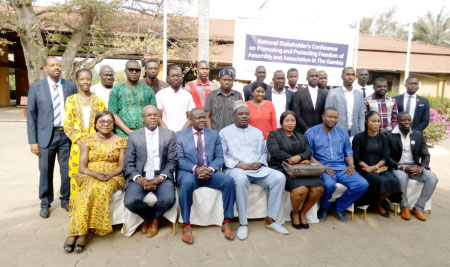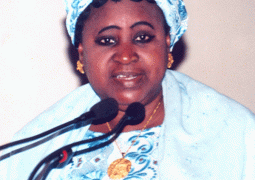
Salieu
Taal, the president of The Gambia Bar Association (GBA) has said that the
application and authorisation of the Public Order Act is a major challenge for
the citizenry and the state, saying the objective of the Act is primarily to
maintain peace and order during a procession.
“As
a country that has a peaceful transition from dictatorship barely three years
ago, the citizenry are more than ever cognizant of the importance of exercising
their fundamental rights under our constitution. Under our current democratic
dispensation, we are witnessing a more vocal and active citizenry, activist
among others,” he said.
Mr.
Taal was speaking yesterday during the opening of two days national forum on
promoting and protecting freedom of assembly in The Gambia at a local hotel in
Senegambia. The two day convergence was
organised by the GBA under the theme: ‘Reflecting on the Current Trends and Operationalisation
of the Republic of The Gambia.’
The
right to freedom of assembly, he added is guaranteed in various regional and
international instruments The Gambia is a party to as a state. The GBA
president said: “No suitable regime will determine when, where and sometimes
why citizenry can actually protest. The exercise of right of freedom of
assembly peacefully is a cornerstone of any vibrant democracy.”
Cherno
Marenah, solicitor general of The Gambia on behalf of the attorney general and
minister of Justice said: “The country came from a 22 year coma and like every
patient who has been in comma for that long we expect that his work or his
attempt to work would be unbalanced and of course a bit slower than that of
those who have been on the journey for a long period of time.”
He
added: “Of course, that is not an excuse for the derogations of fundamental
rights such as freedom of association and assembly. The Ministry of Justice
values all fundamental freedoms and it is not a co-incidence that the first pillar
of our NDP talks about good governance that is anchored on the rule of law and
respect for human rights.”
The
Ministry of Justice, he went on, had formulated its own transitional strategic
plan anchored on three pillars; and key among them is the constitutional
building, institutional building and strengthening such. The establishment of
the anti-corruption commission is
underway as it is before the National Assembly.
He
maintained that freedom of assembly and association are fundamental pillars of any
democracy and good governance. Therefore, freedom of association and assembly
are matters that the Ministry of Justice takes very seriously as they are the
essential tools for citizen participation and grievance outlets for citizens
between elections.
Gaye
Sowe, executive director of Institute for Human Rights and Development in
Africa (IHRDA) underscored the importance of the convergence, while expressing
optimism that the participants will come out with tangible recommendations that
will be of benefit to the citizenry.



